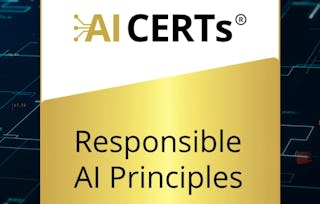The course "Practical Methodologies and Ethics in AI" equips learners with the essential skills needed to build, evaluate, and deploy deep learning models, while also addressing critical ethical considerations in AI. Through hands-on projects and case studies, you’ll explore the practical methodologies used to train models effectively, troubleshoot issues, and apply structured probabilistic approaches to manage uncertainty. A key highlight of the course is its emphasis on ethics, enabling you to identify and address bias, fairness, and societal implications throughout the AI lifecycle. By integrating structured probabilistic models with deep learning, you’ll gain the ability to create robust, interpretable AI systems that tackle real-world challenges.
6 days left! Gain next-level skills with Coursera Plus for $199 (regularly $399). Save now.

Practical Methodology and Ethics in AI
本课程是 Foundations of Neural Networks 专项课程 的一部分

位教师:Zerotti Woods
包含在 中
您将学到什么
Learners will gain hands-on experience training and debugging deep learning models while considering deployment challenges and best practices.
Students will understand and evaluate ethical concerns in AI, including bias, fairness, and the societal impact of deploying neural networks.
Learners will explore how to integrate structured probabilistic models with deep learning, reducing uncertainty and improving model decision-making.
您将获得的技能
要了解的详细信息

添加到您的领英档案
6 项作业
了解顶级公司的员工如何掌握热门技能

积累特定领域的专业知识
- 向行业专家学习新概念
- 获得对主题或工具的基础理解
- 通过实践项目培养工作相关技能
- 获得可共享的职业证书

该课程共有4个模块
"Practical Methodology and Ethics in AI" focuses on teaching essential skills in dataset exploration, training deep learning models, and deploying them, with a strong emphasis on ethics in the AI lifecycle. The course covers identifying and addressing bias and fairness issues and integrating probabilistic models with deep learning to manage uncertainty. This course provides a solid foundation in both technical and ethical aspects for responsible AI development.
涵盖的内容
2篇阅读材料
This module will discuss practical methodologies for training Deep Learning Models. Students will explore case studies along with different situations to apply previous and new knowledge in the process of training and deploying Deep Learning Models.
涵盖的内容
1个视频1篇阅读材料2个作业
This module will discuss ethical considerations for Deep Learning Models. You will explore nuances of ethics and the use of machine learning to make decisions.
涵盖的内容
1个视频1篇阅读材料2个作业
This lesson delves into the intersection of structured probabilistic models and deep neural networks, highlighting how probabilistic frameworks can be integrated with Deep Learning to model uncertainty, learn from incomplete data, and provide interpretable AI systems.
涵盖的内容
1个视频1篇阅读材料2个作业
获得职业证书
将此证书添加到您的 LinkedIn 个人资料、简历或履历中。在社交媒体和绩效考核中分享。
位教师

从 Machine Learning 浏览更多内容
 状态:预览
状态:预览Johns Hopkins University
 状态:免费试用
状态:免费试用Fractal Analytics
 状态:预览
状态:预览AI CERTs
人们为什么选择 Coursera 来帮助自己实现职业发展




常见问题
To access the course materials, assignments and to earn a Certificate, you will need to purchase the Certificate experience when you enroll in a course. You can try a Free Trial instead, or apply for Financial Aid. The course may offer 'Full Course, No Certificate' instead. This option lets you see all course materials, submit required assessments, and get a final grade. This also means that you will not be able to purchase a Certificate experience.
When you enroll in the course, you get access to all of the courses in the Specialization, and you earn a certificate when you complete the work. Your electronic Certificate will be added to your Accomplishments page - from there, you can print your Certificate or add it to your LinkedIn profile.
Yes. In select learning programs, you can apply for financial aid or a scholarship if you can’t afford the enrollment fee. If fin aid or scholarship is available for your learning program selection, you’ll find a link to apply on the description page.
更多问题
提供助学金,







